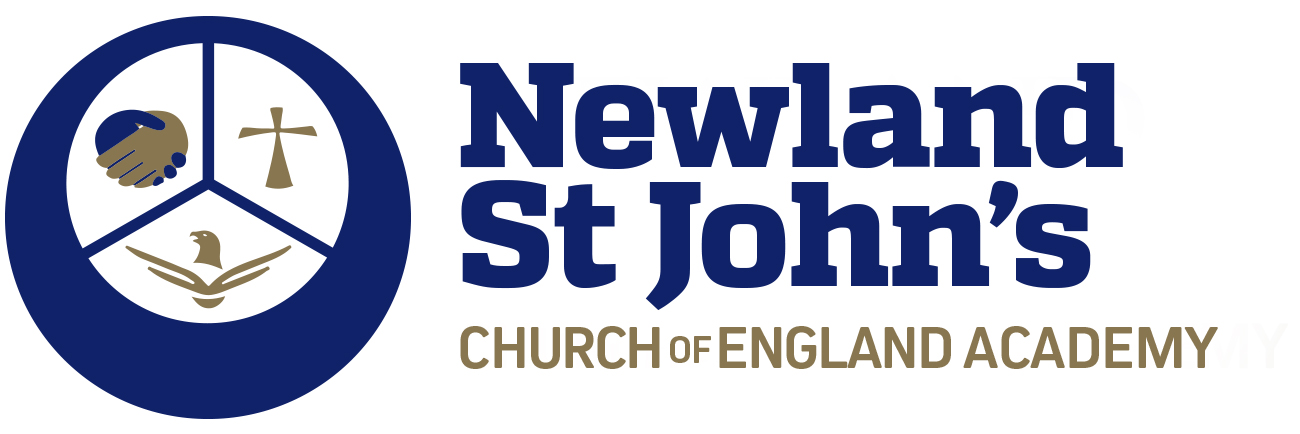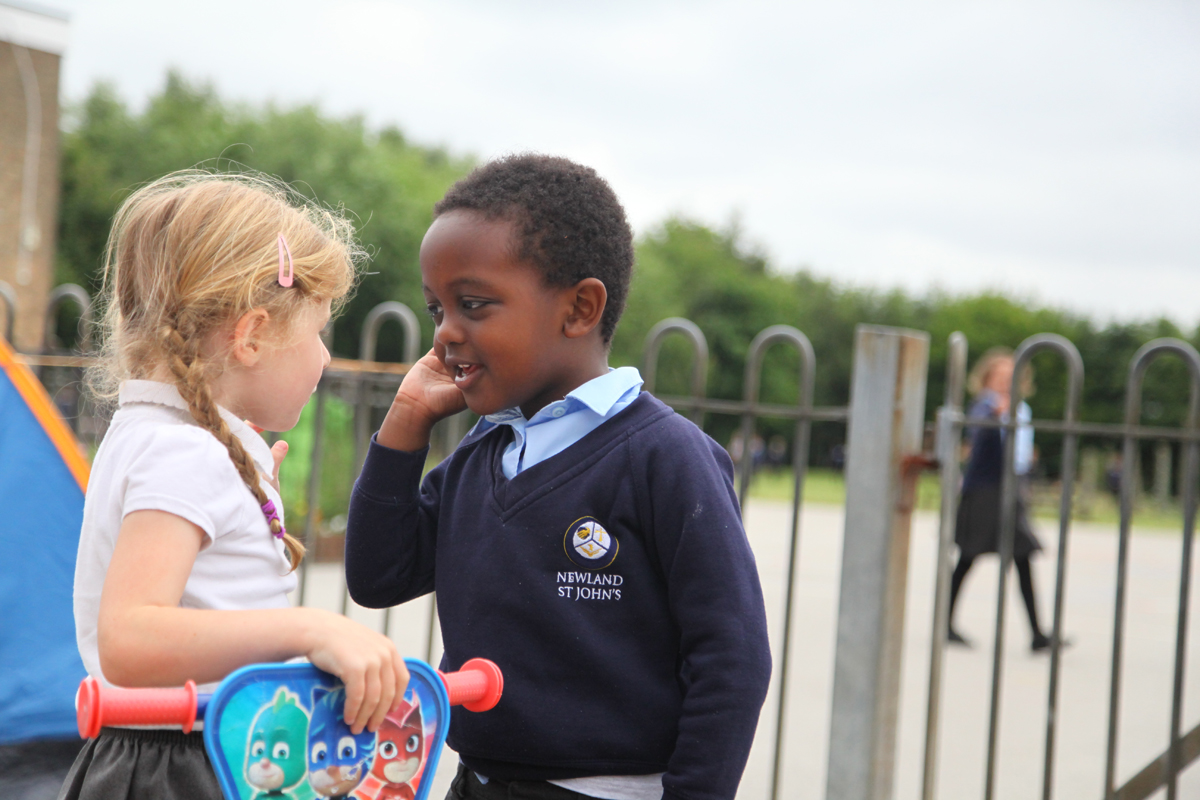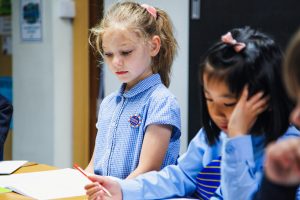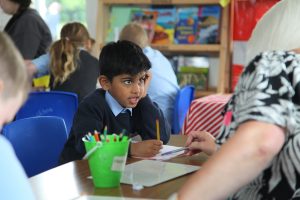
Beresford Avenue, Hull
East Yorkshire HU6 7LS
Early Years
Intent (What we do)
Our Curriculum
At Newland St John’s we believe that children’s early years in education are the most important in their life, building the foundations to help them flourish.
Our Early Years curriculum is planned to meet the specific needs of our children and our diverse community and covers all aspects of the statutory Early Years Foundation Stage Framework 2021 (see below):
The following statement taken from the Early Years Statutory Framework, 2021 summarises the importance of the Early Years and why we strive for excellence in our early years setting.
‘Every child deserves the best possible start in life and the support that enables them to fulfil their potential. Children develop quickly in the early years and a child’s experiences between birth and age five have a major impact on their future life chances. A secure, safe and happy childhood is important in its own right. Good parenting and high quality early learning together provide the foundation children need to make the most of their abilities and talents as they grow up.’

We teach our children to develop a true love of learning where they are free to make connections and start to build their foundational knowledge, skills and understanding.
Our school vision ‘Living Together, Learning Together, and Shining Together in the Love of God’ underpins everything we do. We provide quality learning experiences to develop our youngest children as creative and adventurous learners, fully prepared for Year One and beyond, with all the skills, knowledge and understanding needed to achieve and exceed academically, socially, morally, spiritually and culturally. We adapt our curriculum to meet the needs of our children, ensuring flexibility so that our children can follow their own interests, allowing for their individual talents and needs to be valued and nurtured.
This is underpinned by the Trust vision for Excellence in the Early Years
The EYFS Framework:
- sets the standards that all early year’s providers must meet to ensure that children learn and develop well
- ensures children are kept healthy and safe
- ensures that children have the knowledge and skills they need to start school
The Characteristics of Effective Learning
The three characteristics of effective learning describe the behaviours children use in order to learn.
- Playing and exploring – children investigate and experience things, and build the resilience to ‘have a go’
- Active learning – children concentrate and keep on trying if they encounter difficulties, and enjoy achieving
- Creating and thinking critically – children have and develop their own ideas, make links between ideas, and develop strategies for doing things.
The Areas of Learning and Development
The three prime areas are particularly important for building a foundation for igniting children’s curiosity and enthusiasm for learning, forming relationships, and thriving, underpinning the specific areas of learning.
The Prime Areas:
- Communication and Language
- Personal, social and Emotional Development
- Physical Development
There are four specific areas through which the prime areas are strengthened and applied.
The specific Areas:
- Literacy
- Mathematics
- Understanding the world
- Expressive arts and design
Link: EYFS Framework
Learning to read and write at Newland St John’s CE Academy
Phonics is taught in Reception and Key Stage 1 using the Read, Write, Inc. programme (RWI) which is a systematic and highly effective approach used for the teaching of early reading and writing. Alongside RWI, we develop children’s speaking and listening skills through their ability to respond to sounds, play with sounds, songs and rhymes. These are all important skills for learning to listen to others, understanding questions and developing concepts of things and lays the foundations for the phonic work which starts at the beginning of Reception.

EYFS Curriculum Implementation – Our Offer
We have one Early Years Classroom – Dormice Class
Our Learning Environment
Our carefully planned learning environment promotes calmness, is purposeful and develops children’s natural curiosity, offering progression as they grow.
We offer an engaging learning environment at Newland St John’s that is calm, communication-rich and promotes a feeling of homeliness. This ensures our children feel safe and secure. Carefully planned progression of routines and behavioural expectations ensures that our children develop high levels of respect and care. Our outdoor area enables our children to explore, be curious and develop important gross motor skills. Our wide range of learning activities engage and inspire and provide challenge, both mentally and physically. We access our Forest Schools area weekly to build dens, enjoy songs and stories outside, and to learn about nature and the world around us. We believe in offering our children first-hand experiences and opportunities to broaden their knowledge and understanding of the world through visits and visitors.
What our learning environment offers:
A carefully organised and planned environment supports high quality and purposeful play:
– areas of learning provide high quality, open ended and accessible resources for children of all abilities
An environment that engages and maintains children’s interest:
– resources and provision available will reflect changing children’s interests and motivations to learn
– only high quality resources and displays are used
– children are taught to take care of resources
A learning environment meet the learning and development needs of all children:
– resources will be appropriately planned for to meet the learning needs of children and provide stimulating challenge
An environment that promotes a calm and nurturing atmosphere that stimulates a desire to learn:
– adults will speak calmly, praise will be used, lighting will be dimmed, there may be calming background music playing
Carefully considered and tailored positioning and arrangement of provision areas is to maximise learning:
– the classroom will promote a positive atmosphere
– learning will take place in quiet enclosed spaces and areas which allow for wider exploration and creativity
– classroom arrangement supports free-flow play between provision areas and provides opportunities for children to make connections in their learning
A seamless transition between indoor and outdoor provision, with high expectations for behaviour and learning in all areas:
– indoor and outdoor provision will be accessible to children at all child
– all staff model high expectations of behaviours for learning and and social interactions in all learning spaces
A balance of indoor and outdoor learning:
– provision is organised carefully to provide opportunities to develop skills and knowledge appropriate to the cohort of children.
– use and balance of indoor and outdoor learning spaces is planned to meet the learning behaviours of children and maximise the impact of provision
A learning space where children are taught to use and access resources with responsibility and purpose
– children are taught to use resources carefully
– children are taught to tidy up after themselves and help each other
The Role of Adults in EYFS
At Newland St John’s we have a skilled and dedicated team of staff in Early Years who are committed to excellence and to ensuring our children ‘shine’ personally and academically. Detailed below is the specific role of adults in our Dormice class:
Adults plan for quality sustained interactions with children – this could be linked to planned learning outcomes or spontaneous learning opportunities:
– adults will be engaged in conversations with children during play to support learning effectively
– adults may also observe children during taught sessions, recording reflections and responses
– interactions will be purposeful , develop curiosity, pose questions, and scaffold learning
Adults are highly tuned to children’s capabilities and motivations and make considered decisions about how to adapt provocations, provision and resources:
– adults will use observations and professional discussions to reflect on individual needs of children and plan to support as necessary
Adults exploit opportunities to capture children’s interests and motivations so they develop skills and knowledge
– provocations will be presented in a number of ways
– they are planned by adults to target specific identified needs
– they can be led by children’s curiosity, based on a current interest to develop a deeper learning journey
Adults have high expectations of all children, regardless of their starting points and barriers to learning:
– adults will demonstrate a nurturing approach at all times and show sensitivity to the individual needs of children without judgement
– adults use assessment to identify barriers to learning
– adults adapt their teaching to overcome learning barriers for all children
– adults work towards personal and academic excellence for all children regardless of background
Adults ask high quality questions:
– adults will scaffold interactions with planned quality questions to support learning showing a vested interest in the responses being offered
Adults provide scaffolding for children to support children’s thinking:
– adults will show a deep understanding of children’s learning needs and have a clear subject knowledge to understand the child’s starting points and where they need to be next.
– adults will promote a positive growth mindset.
– scaffolding includes additional resources, experience and adult interactions that allow access to the learning
Adults work collaboratively towards a shared vision:
– adults develop their practice collaboratively
– all adults will show professionalism and respect as they build children’s foundational learning
Adults build positive relationships and model expectations to children:
– adults will develop trusting relationships with each other and the children, showing respect for their individual interests and providing a safe space for ideas and views to be expressed
All adults have high expectations of children’s behaviour and are proactive in modelling and promoting positive behaviours.
– adults promote and support children in developing self-regulation and resilience
– adults consistently treat all children equally and fairly, with unconditional positive regard
– adults aim to sensitively identify and address the factors that lead to negative behaviours
Our Partnerships
Working closely with our families, developing and sustaining positive relationships provides the best possible start to their children’s education. We communicate with our parents in a variety of ways, first and foremost in person. Our Early Years team greet children each morning and say goodbye each afternoon. We share reports and hold parents evenings throughout the year to discuss progress and targets they are working towards. We use an online tool called ‘Tapestry’ through which we share photographs and information about children with parents who can also contribute through the app. Our Early Years class regularly shares the learning and experiences that are happening during the week through Twitter and our termly newsletter. We share what the children will be learning each term, including ways to help the children through our curriculum overview and information letters. Our classes have Curriculum Books that showcase the ‘beyond the curriculum’ experiences that happen, these are shared with both parents and children.
We hold a variety of meetings and workshops for and with our parents about starting school, teaching and learning phonics and mathematics, ‘share a story’ and stay and play sessions.

Impact
The impact of our vibrant curriculum, language-rich environment combined with skilful, dedicated practitioners is the successful development of our children as unique learners. Our children feel valued for their uniqueness and in turn value and respect differences in others. Adults listen and respond to the children, play with them and show genuine interest in what they say and do. Our children understand the importance of kindness and know that this begins with themselves and extends to friends, family, community and our world. They will become creative thinkers and learners who are bold and resilient. Strong personal, social and emotional skills enable them to engage fully in teamwork valuing all contributions, confident to talk to a range of people due to the strength of their language and vocabulary skills. Our children will be fully prepared for their transition to Key Stage One, able to remember and apply vital knowledge and skills with the motivation and resilience to succeed.
Our EYFS Outcomes
At Newland St John’s we have high expectations of all children regardless of their backgrounds, experience or learning needs. We strive to ensure that all pupils make strong progress across all areas of learning and ongoing assessments identify pupils who may need more support to achieve this. Our curriculum and provision takes into account children’s interests and differing learning needs. Adult interaction and support is also differentiated according to pupils’ developmental stages. We support and empower children to believe in themselves and strive to be shining beacons in the community.
In 2022, 60% of our children met the Early Learning Goal standard at the end of the EYFS. Our target is to improve this in the academic year 2022/23 to ensure as many children as possible get the best start to school they can.
